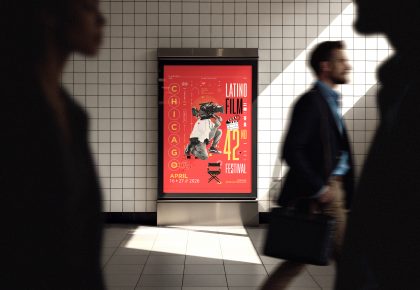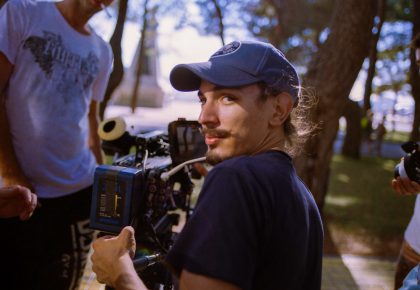
From film noir (A State of Madness, 2020) to comedies (Juanita, 2018), from straightforward dramas (Love Child, 2011) to a re-telling of Shakespeare’s Romeo & Juliet (Cristo Rey, 2013), Dominican director Leticia Tonos Paniagua’s filmography as a director, writer and producer is perhaps the most eclectic and diverse in the entire Caribbean. Now, with her most recent film Aire. Just Breathe, she tries her hand at the kind of idea-driven science-fiction that made instant classics out of such films as Douglas Trumbull’s Silent Running (1972). The film was selected to represent the Dominican Republic for the Academy Award for Best International Feature this year; it is the fourth of Leticia’s films to represent the country for this award after Love Child, Cristo Rey and A State of Madness.
The year is 2147: environmental pollution after a deadly chemical war has reduced the world’s population to extinction level. Tania, a conservation biologist, has been working in finding a way to prevent the extinction of her species with the help of VIDA, an Artificial Intelligence system with whom she has forged a symbiotic relationship. But the arrival of Azarias, a traveler with a hidden past, throws off kilter the safe, almost sterile environment both scientist and AI felt so secure in.
Leticia talks to us about why she wanted to do a science-fiction movie, the challenges of making the film and her next project, a musical biopic about the Queen of Merengue, Milly Quezada:
Your feature debut, Love Child (La hija natural, 2011), won the Audience Choice Award for Best Feature at the 27th Chicago Latino Film Festival. What does the Festival mean for you?
Not only was attending the Festival with my first feature a wonderful experience because of the award, but it was also the first film festival I attended as a filmmaker! It was the best start to my career not only because of the warm welcome from the moviegoers and from Pepe (Vargas, executive director of the International Latino Cultural Center of Chicago), and also because of the experience of bringing a movie that is so representative of our country to an international audience. Up to this day, it stands as a wonderful memory and an experience from which I learned a lot.
From the Santo movies to graphic novels like El Eternauta to the short stories and novels by Yoss, science-fiction has left its mark in Latin American literature and cinema. And yet, it is still very rare in Caribbean cinema. Even so, we have two science-fiction features from the region at the Festival this year, including yours. Why do you think science-fiction has yet to be seen as a viable genre in our countries?
I do think our countries see science-fiction as a viable genre. I, at least, have a very particular opinion on the matter. For me, it comes from a need to express ourselves, to not limit ourselves to the type of stories we can tell, not only about the past and the present but also about the future. I know that, often, our countries’ societal needs, the problems we may have politically, socially, about poverty, often impede us from having a vision of the future, right? But I think it is a healthy sign that as an industry we want to tell stories, that we want to reclaim the right we have as Latinos and Caribbeans to offer our perspective and tell stories that express our doubts about the future from a particular perspective.

How was the idea for Aire.Just Breathe born? How were you able to pull it off?
The first challenge was the budget, because generally the science-fiction films we are used to seeing on the big screen are the product of a much larger industry with much larger budgets, so my director of photography, my production designer and myself had to sit down and figure out a strategic way to use the resources we had at hand. One of the decisions we made, and it was really a way to be coherent with the film’s narrative, was that 95% of the materials used in the set design had to be from recycled materials. That, of course, helped bring down costs and gave the sets, especially the bunker, a unique aesthetic.
I came up with the idea for Aire. Just Breathe, if I am not mistaken, a year before the pandemic. I’ve always loved science-fiction but I am also respectful of it. The original pre-pandemic story was much, much darker. Once we got out of the pandemic, I revised the script and I felt that, after all we had gone through, I was not up to telling such a dark story and that I would also be contributing to the uncertainty, right?, that we had about the future. I thought of offering some hope through Aire. Just Breathe.
How would you describe your experiences of shooting your films at Pinewood Studios in the Dominican Republic? And how has this studio helped the development of the country’s film industry?
It’s wonderful to shoot at Pinewood; their facilities are fantastic, nothing to envy their studios in London and Atlanta. It fulfills all the requisites plus it’s also right in front of the beach! But besides the fact that the studio is so complete, there is a close professional relationship with studio executives who have had the vision and know the importance of producing Dominican films. Even though they have a large international clientele, they always carve a space for the production of local films; I think that theirs is a smart vision because it not only guarantees a steady year-round flow of productions but it also helps foster a community of filmmakers who help each other. The studios have played a fundamental role in the development of our film industry these past years.
You are currently working on a musical biopic about pioneer merengue singer Milly Quezada. What can you tell us about this new project and how far are you in its production?
My filmography is rather eclectic, isn’t it? I am really attracted to genres. So, yes, I am working on a movie about Milly, the Queen of Merengue, which is currently in post-production. It’s a co-production with Puerto Rico. I believe we will have the film ready in two, three months, max. And we have a strategic release plan. We are choosing a festival for its World Premiere. And well, what can I spoil for you?
I am incredibly happy with the end result. Music is such an important part of our culture. And besides, we are talking about the Queen of Merengue who’s been working in the industry for more than 45 years. She’s been an inspiration not only for artists of her generation but contemporary ones as well. It’s been a complete honor that Milly Quezada trusted me with her life story. We all gave a lot to the film. We embraced the challenge of producing another genre rarely done in the Caribbean, the musical, with our heads held high.
Aire. Just Breathe will screen on Sunday April 6 at 9:00 p.m. and Tuesday, April 8, 8:30 p.m. alongside the Colombian short Thirst (Sed) by Julián Díaz Velosa at the Landmark Century Center Theatres.

